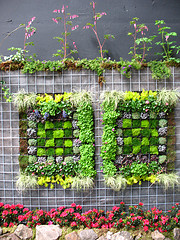Vertical Gardens Offer More than Just Space Saving
 Gardens that grow vertically rather than spreading across the landscape are all the rage among urban gardeners these days. Their popularity is largely due to the fact that they allow both homeowners and renters to grow bountiful crops of produce or flowers in a small area of square footage. You don’t need a big backyard – a vertical garden works just fine on a small strip of soil in front of your house or even on a balcony. But beyond their space-saving abilities, vertical gardens have a host of other benefits to offer you.
Gardens that grow vertically rather than spreading across the landscape are all the rage among urban gardeners these days. Their popularity is largely due to the fact that they allow both homeowners and renters to grow bountiful crops of produce or flowers in a small area of square footage. You don’t need a big backyard – a vertical garden works just fine on a small strip of soil in front of your house or even on a balcony. But beyond their space-saving abilities, vertical gardens have a host of other benefits to offer you.
1. Protection. Hard-working vertical gardens help shield your home’s exterior against harsh weather conditions and ultraviolet rays. If you live in an exceptionally rainy state like Alabama, “green wall” gardens can help protect your Birmingham paint job from damage.
2. Insulation. These vertical plantings also act as a form of insulation, increasing the energy efficiency of your dwelling and potentially earning LEED credits for your house.
3. Shade and privacy. Placed on the outside of a window, a vertical garden will shade the room from both strong sunlight and inquisitive passersby, as well as creating a lovely view in a crowded urban neighborhood.
4. Green "fencing." Vertical gardens may be either trained to grow up an existing fence or supported on purpose-built frames or posts. These green fences will offer you not only privacy and aesthetic appeal, but also noise reduction.
5. Eyesore cover-up. You might want to hide unsightly objects on your property, such as garbage cans or an electric meter, with a screen formed by vertical plantings.
6. Indoor room divider. Indoors, a vertical garden will work as an attractive room divider. Planting in wheeled containers is recommended so that the divider can be moved -- or removed altogether -- according to your needs.
7. Air quality improvement. Speaking of indoor vertical gardens, adding plants inside your home will serve to improve the air quality. Live greenery removes carbon dioxide and absorbs common indoor pollutants like formaldehyde (yuck!), found in some carpet dyes and wood flooring resins.
8. Repurposing-friendliness. Vertical gardens lend themselves to the use of repurposed materials. They may be planted in such unusual “pots” as recycled plastic bottles or old shoe organizers.
9. Natural beauty. For folks living in urban apartments or working in office cubicles, vertical gardens can provide access to soothing natural beauty, necessary for mental health.
10. Less physical stress. Gardeners with conditions such as arthritis or fibromyalgia are able to enjoy tending and harvesting their flowers or vegetables without the physical stress of having to bend and kneel.
11. Obstacle avoidance. People whose yards contain poor quality soil or large tree roots do not have to invest time and money remedying these inconveniences, but rather just set up a vertical container garden.
12. Pest-proofing. Vertical gardens may be placed out of easy reach of animal and insect pests like rabbits, snails or earwigs, making organic gardening without pesticides much easier.
13. Weed control. It is much easier to control the spread of weeds, which minimizes time spent on one of the least pleasant gardening tasks.
14. Happier, healthier plants. Growing upward is also beneficial for the vegetation itself. The surface of the plants receives greater exposure to the sun and increased air circulation, with a healthier garden landscape as the happy result.
Laura Firszt writes for Networx.com.
Updated April 8, 2018.
Looking for a Pro? Call us (866) 441-6648

Electrical Average Costs
Electricians Experiences

Oak Tree Planting Looks Great In Our New Home’s Spacious Yard

Seamless Extension Of Concrete Patio And Poolside Retaining Wall



